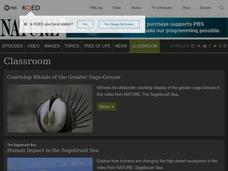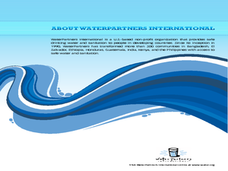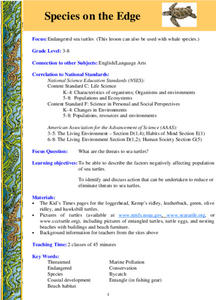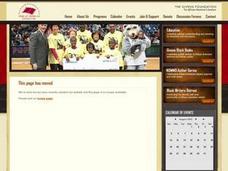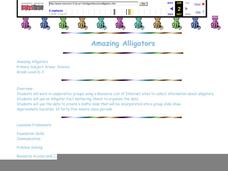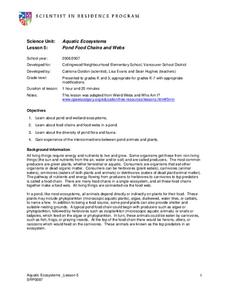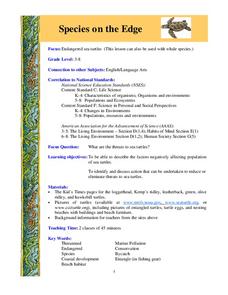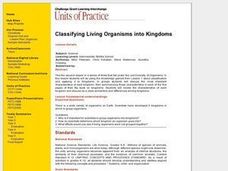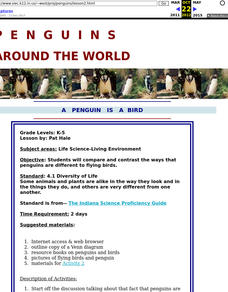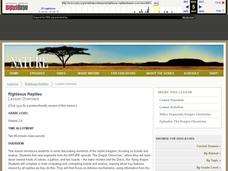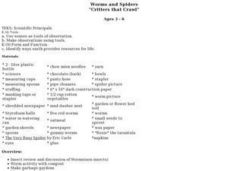Curated OER
Termitology
Students engage in an inquiry-based study of the ecology of termites. Through hands-on investigations, they explore the life cycle of termites, the termite's role in the food web, and the unique social structure of termite colonies.
Fluence Learning
Writing About Literature Shakespeare and Plutarch
The Oscar for the Best Adapted Screenplay acknowledges a writer's excellence in adapting material found in another source. What do your class members know about adapted resources? Find out with an assessment that asks readers to compare...
Curated OER
Pond Exploration
Students take a hands-on approach to explore the world beneath the water in this activity. They examine the creatures they catch to study about the adaptations these animals have that allow them to survive in this harsh environment. They...
Curated OER
Assessment & Evaluation
Seventh graders study elapsed time, radioactive decay and half-life. In this time machine instructional activity students complete several activities and view a presentation.
Curated OER
Characteristics of Snakes and Turtles
Students examine the characteristics of snakes and turtles and compare/contrast reptiles with mammals. They watch a video, answer discussion questions, complete information charts, conduct Internet research, and create a habitat diorama.
Curated OER
Pet Detective WebQuest
Students take an online tour to learn about pets and their care. They click on selected Web links and answer questions about the material they encounter. They share something they learned from the WebQuest with a partner.
Curated OER
Walking For Water
Young scholars investigate how third world countries get their water. In this water instructional activity, students research how countries like Kenya and Ethiopia get their water supply. Young scholars participate in an experiment to...
Curated OER
Species on the Edge
Students describe factors negatively affecting population of sea turtles, and identify and discuss action that can be undertaken to reduce or eliminate threats to sea turtles and other endangered species.
Curated OER
Investigating Stereotypes
Students study 'stereotype' in literature and life and give examples. they provide examples from life or literature on the origins and impact of stereotypes. they
3. Cite 3 - 5 individual African Americans from literature or life who...
Curated OER
Fred the Fish -- A River Ran Wild
Students apply cause and effect relationships to water pollution in a stream. In this pollution instructional activity students recognize the importance of clean water in their daily lives. Students accompany "Fred the Fish" as he...
Curated OER
Amazing Alligators
Students uncover facts about the alligator: including but not limited to habitat, characteristics, food, traits, habits, offspring and interesting facts.
Curated OER
The Things We Do
Fourth graders conduct a literature study in order to investigate the concept of change and how it occurs in the environment. The teacher uses the method of concept development for investigation.
Curated OER
Interdisciplinary Approach to Investigating Popcorn
Students conduct a lab experiment using the scientific method. In this interdisciplinary lesson plan, students will test the difference in popping white and yellow corn. Students will write their lab report in their science, math,...
Curated OER
Hide In Plain Sight
Young scholars view video clips and use the Internet to look for hidden animals. They then use the Internet to print out animal shapes and color them. They create environments on construction paper in which their animals can hide.
Curated OER
How Does a Green Plant Grow?
Students of all ages can explore the question "how do seeds grow?", design an experiment to answer the question, predict the outcome of the experiment then conduct the experiment.
Curated OER
Aquatic Ecosystems
Students study ponds and wetland ecosystems and examine the food chains and webs in them. In this aquatic ecosystems lesson students answer questions about the diversity of the flora and fauna in a pond.
Curated OER
Walking for Water Mini-Unit
Young scholars participate in an activity that requires them to consider the availability of water. In this "walking for water" activity, students read "Women Bear the Weight of Water," and respond to discuss questions regarding the...
Curated OER
Species on the Edge
Young scholars examine sea turtles. In this endangered species lesson, students analyze sea turtle habitats. Young scholars hypothesize why sea turtles could go extinct.
Curated OER
Classifying Living Organisms into Kingdoms
Learners create a flip book that describes the basic characteristics of the five main animal kingdoms. They research the animal kingdoms, include examples of organisms for each kingdom and illustrate the finished text.
Curated OER
A Penguin is a Bird
Students compare and contrast the ways that penguins are different to flying birds.
PBS
Righteous Reptiles
Young scientists write and draw about their knowledge of reptiles. They also view a nature video focusing on lizards and snakes, complete a chart comparing and contrasting them. Next, they focus on the defense mechanisms that they...
Curated OER
Bats, Bats, Everywhere!
Students research information on bats while working in cooperative groups. They design posters with the information from their research.
Curated OER
How Does a Green Plant Grow?
Students examine how a seed grows, and design an experiment to explore this concept. They make predictions, conduct the experiment, record the results, and interpret the results.
Curated OER
Worms and Spiders: "Critters That Crawl"
Students complete a unit of lessons on spiders and worms. They discuss worm and spider characteristics, create a garbage garden, observe worms, create gummy worm prints, read the book, 'The Very Busy Spider,' and construct a spider and...






